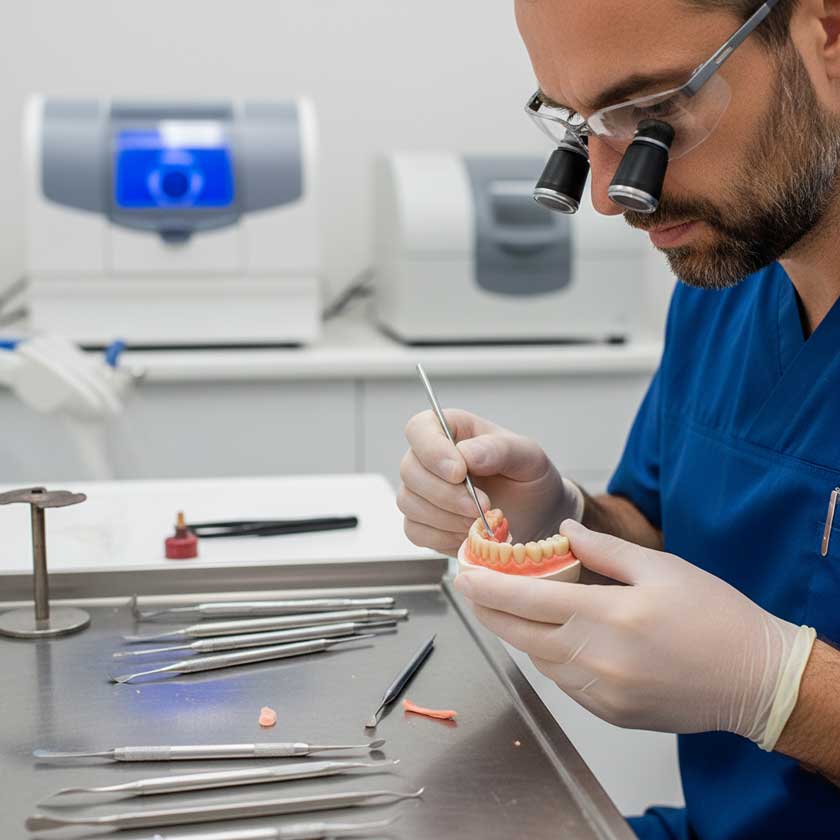If you wear dentures, you understand the importance of having a comfortable fit. Unfortunately, denture pain, gum irritation, and sore gums can sometimes make wearing dentures challenging. In this article, we will discuss why dentures can be uncomfortable and give advice on how to make them fit better.
Key Takeaways:
- Ill-fitting dentures and bacterial buildup are common causes of gum irritation and denture pain.
- Bone resorption and damage to the dentures can also contribute to discomfort.
- Seeking professional help and making necessary adjustments can provide denture pain relief.
- Proper denture care, including regular cleaning and maintenance, prevents gum irritation.
- You can enjoy a pain-free, perfect denture fit by following these tips.

Common denture problems and causes.
Dealing with denture discomfort can be frustrating and significantly impact your daily routine. Knowing the issues and reasons for denture problems can help you find solutions and ease gum pain and swelling.
Ill-Fitting dentures
One of the primary causes of denture discomfort is ill-fitting dentures that no longer match the shape of your mouth. Over time, changes in the jawbone structure can lead to dentures rubbing against the delicate gum tissue, causing sore spots and raw skin.
Bacterial buildup
Improper denture cleaning and maintenance can lead to bacterial buildup on the denture surface. This can result in gum inflammation and sores, making it uncomfortable to wear dentures. Regular cleaning and proper oral hygiene are crucial to prevent this issue.
Bone resorption
Bone resorption, the loss of bone tissue in the jaws over time, can cause gum pain and affect the fit of your dentures. When the shape of the bones change, dentures may not fit well, causing gum discomfort and sensitivity.
Denture damage
Chips, cracks, and other damage to the dentures can also result in denture discomfort. Damaged dentures can create pressure points that irritate the gums, making it challenging to wear them comfortably. Regular denture check-ups and adjustments can help address this problem.
Learn about denture problems and their causes to find relief from gum pain caused by dentures. To maintain the quality and fit of your dentures, it is crucial to care for them and seek professional assistance.
Check out our other article addressing denture pain: The importance of address denture pain.
Denture pain relief methods.
If you're experiencing denture pain or gum ulcers, you can try several effective methods to find relief. Getting help from a dentist to check if your dentures fit well and make any needed changes is important.
Adjusting dentures can relieve discomfort by improving their fit or fixing chips and cracks.
Maintaining proper denture cleaning and oral hygiene is also crucial in preventing bacterial buildup and gum irritation. Regularly cleaning your dentures and using appropriate denture-cleaning solutions can help reduce gum ulcers and irritations.
Another helpful tip for denture pain relief is taking your dentures out at night. This allows your gum tissue to rest and recover from any irritations caused by wearing dentures throughout the day.
Follow your dentist's advice and use these methods to manage denture pain for a more comfortable experience.
Check out our other article regarding denture relief: Relief from gum pain.
Denture care tips.
Proper denture maintenance is crucial for ensuring oral health and preventing discomfort. Follow these tips to keep your dentures in excellent condition:
- Clean your dentures daily: Use a denture brush and liquid soap or denture cleaning paste to clean your dentures thoroughly. This helps remove bacteria, food particles, and plaque that can cause gum irritation and pain.
- Soak dentures in water or cleaning solution overnight to remove bacteria and debris. This is especially important to prevent gum inflammation and sore spots.
- Avoid using hot water or toothpaste: Hot water can cause dentures to warp or lose their proper fit, leading to gum pain. Similarly, toothpaste and household cleaners can damage the denture material. Stick to denture-specific cleaning products to ensure their longevity.
- Brushing your gums, tongue, and roof of your mouth with a soft-bristle toothbrush can have multiple benefits. It can improve blood flow, enhance oral health, and reduce gum irritation caused by dentures.
- If you wear partial dentures, remember to keep brushing and flossing your real teeth to maintain their health. This helps maintain a healthy mouth and prevents gum pain and irritation.
By following these denture care tips, you can keep your dentures clean, maintain a proper denture fit, and prevent gum irritations and sore spots. Go to the dentist regularly for check-ups and adjustments to keep your dentures comfy and your mouth healthy.
Alleviating denture discomfort.
Denture discomfort can be frustrating, with problems like dentures cutting into gums and gum irritation causing significant discomfort. However, there are solutions available to alleviate denture-related pain and achieve a pain-free, perfect fit. By addressing the root causes of denture discomfort, individuals can find effective relief and enhance their oral health.
One of the leading causes of denture pain is ill-fitting dentures. Seeking professional help and making necessary adjustments can provide denture pain relief. A dentist can check if your dentures fit well. They can also make changes to ensure they are comfortable and do not hurt your gums.
Proper denture care is crucial in preventing gum irritation and maintaining oral health. Regularly cleaning dentures with a denture brush and cleaning paste or liquid soap is important. Soak dentures in water or cleaning solution overnight to remove bacteria and food, reducing gum inflammation and discomfort.
By following these tips for denture maintenance and seeking professional help, individuals can experience significant relief from denture-related discomfort. With a well-fitting and well-maintained set of dentures, you can enjoy the confidence of a pain-free smile.
FAQ - Denture pain.
What causes denture pain and gum irritation?
Denture pain and gum irritation can occur due to ill-fitting dentures, bacteria, bone loss, and damage to the dentures.
How can I relieve denture-related pain?
Getting assistance from a dentist for fixing dentures can ease the discomfort caused by pain, chips, and cracks.
What can I do to prevent gum irritation from dentures?
Proper denture care, including regular cleaning and maintenance, prevents gum irritation. Maintaining good oral hygiene and seeking professional help for adjustments can also help prevent gum sore spots.
How should I clean my dentures?
You should clean dentures daily using a denture brush and liquid soap or a denture cleaning paste. Soaking dentures overnight in cool water or a denture cleaning solution can help remove bacteria and food particles.
Should I brush my gums if I have dentures?
Yes, brushing your gums, tongue, and roof of the mouth regularly to promote oral health is essential. You should also brush and floss your natural teeth if you have partial dentures.








